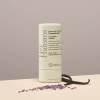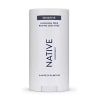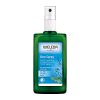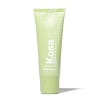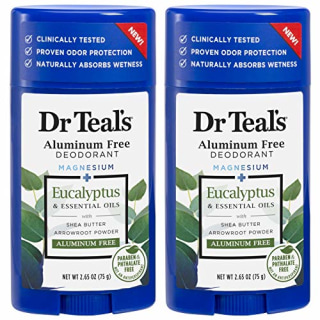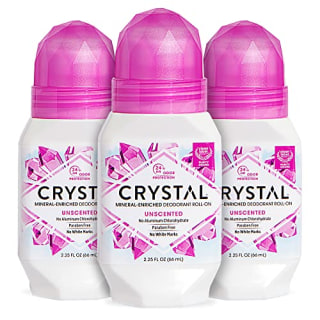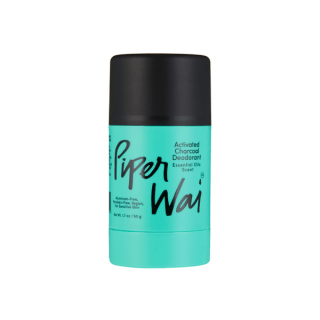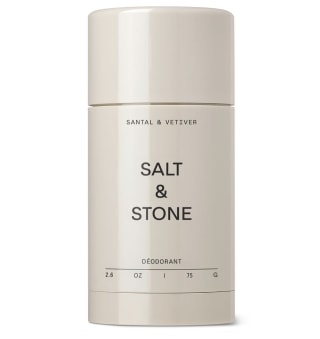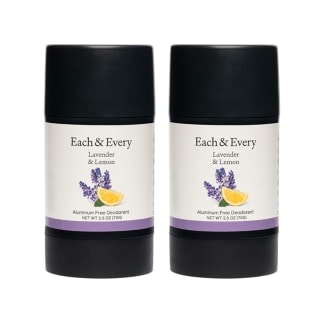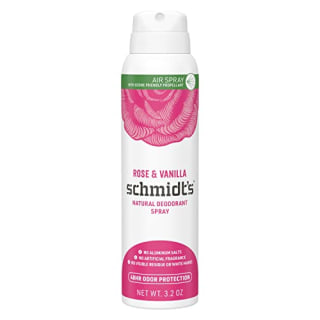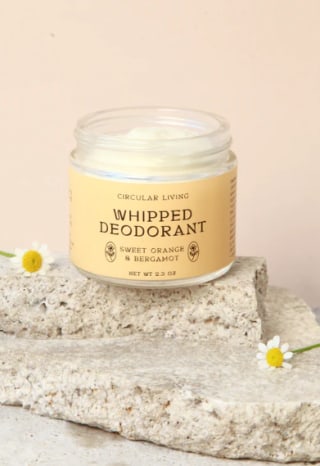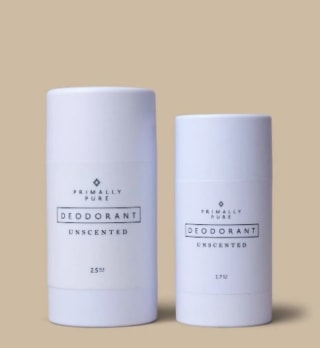As the wellness movement gains momentum, so have my anxious sweats. It's hard to ignore the questions experts and influencers are raising about the ingredients in personal care products. And they have a point; what exactly are cyclopentasiloxane and decamethylcyclopentasiloxane, and why am I applying them to my underarms?
This is where natural deodorants come in. While there is no official or universal definition of a "natural" product, natural deodorants typically claim to be made from materials that aren’t synthesized in a lab. And opting for a natural deodorant is one way to make more informed decisions about what we put on our bodies.
“On average, women put over 125 chemicals on their skin a day,” says Dr. Julie Greenberg, a licensed Naturopathic Doctor and Registered Herbalist at The Center for Integrative & Naturopathic Dermatology. “These are things like emulsifiers and preservatives, phthalates and endocrine disruptors. We really want to limit exposure where possible.”
There’s also a lot of talk about aluminum and the negative effects it might have on the body. While there’s no clear scientific evidence of its effects, we can make a conscious effort to lather ourselves in fewer substances we’re unsure of.
Ready to dig in? Use the links below to jump to the category of your choice.
What to look for | Best budget | Best roll-on | Best during detox | Best stick | Best spray | Best for BO | Best moisturizing | Best for sensitive skin | How we chose | Meet our experts
What to look for in a natural deodorant
Sweating is a natural bodily function that helps regulate body temperature, but it can also happen at less convenient times, like when we're nervous.
“You have no control over it. You sweat because the central nervous system says it’s time for you to sweat,” says Phil Klepak, an antiperspirant and deodorant technology consultant and member of the Society of Cosmetic Chemists.
So, can going natural really help with sweat and odor? Experts say yes; just keep an eye out for these five key qualities when shopping.
Antimicrobial ingredients: Natural deodorants neutralize odors with antimicrobial ingredients, including essential oils, coconut oil and naturally derived baking soda. Sweat doesn’t have an odor — at first. According to Klepak and Greenberg, we have trillions of tiny microbes to blame for our BO. They live on our skin and decompose the organic materials found in sweat, which causes the stench. Natural ingredients with proven antimicrobial properties help eliminate microbes living on the skin of your underarms.
Absorption ability: Natural deodorants absorb excess moisture and reduce humidity with ingredients like activated charcoal, arrowroot powder, clays, tapioca starch and naturally derived baking soda. When it comes to stopping sweat, antiperspirants are the go-to. However, these products contain aluminum, which clogs pores to stop sweat from exiting. Deodorants don't prevent sweating; instead, they neutralize bacteria, mask odors and absorb moisture. Although some antiperspirants also act as deodorants, it's important to note that deodorants are not antiperspirants.
Natural scents: When pharmacist and nontoxic advocate Amy Enos shops for a deodorant, she says it can be easier to look for red-flag ingredients worth avoiding, like “fragrance.” According to Greenberg, "fragrance" can mean that a product may contain over 2,000 undisclosed chemicals that companies claim as proprietary. Rather than fragrance, opt for scents derived from natural ingredients like essential oils.
Consider the ease of application: Natural deodorants come in creams, sticks, gels, sprays, rollers and salts. Whichever you choose comes down to personal preference. With the exception of salts, the base of the deodorant is made of ingredients that glide or apply smoothly to the skin. Rather than mineral oil or petrolatum, which are byproducts of the oil industry, Greenberg says to choose deodorant sticks made with beeswax, shea butter, coconut oil or cocoa butter.
Active ingredients, not marketing buzz: While shopping for natural deodorants, we came across ingredients with unfamiliar uses, like probiotics. We asked our experts for their thoughts on these ingredients and reached out to the companies for their insight, too. We requested full transparency from the brands, which we at Shop TODAY take seriously, but couldn’t confirm the legitimate benefit of probiotics in deodorant. Klepak and Greenberg express confusion about their role in minimizing odors, and studies caution that skin care products containing probiotics may not meet beneficial probiotic requirements.
Best budget-friendly natural deodorant
Hey Humans Naturally Derived Deodorant
- Easy to recycle
- Array of gender-neutral scents
- You may need to warm up the stick between your hands for 20 to 30 seconds because of the paper packaging
Application: Stick | Key ingredients: Shea butter, coconut oil, arrowroot powder, rosemary extract, baking soda, tapioca starch, zinc ricinoleate and essential oils | Scent: Varies (the above has notes of lavender, vanilla and rosemary)
Hey Humans checks all the right boxes with its affordable, natural formula that is kind to both our skin and the planet. They prove that all-day coverage made possible by quality ingredients doesn’t have to cost a ton. The aluminum-free formula (like all our picks) glides on smoothly. Plus, it keeps odors from creeping up with a mix of sweet orange, lime and bergamot oils.
Dr. Teal's Aluminum-Free Deodorant with Magnesium
- Doesn't clog pores
- Non-abrasive
- Not the easiest to apply
Application: Stick | Key ingredients: Arrowroot powder, baking soda, magnesium, shea butter, jojoba oil, essential oil, coconut oil | Scent: Varies (the above smells like eucalyptus essential oil)
Former Shop TODAY editor Fran Sales, an excessive sweater and someone who prefers using natural products, has tried them all. Dr. Teal's aluminum-free, magnesium-infused formula is one of the two products she reached for time and time again (the other is Native, below, if you must know!).
Arrowroot powder and baking soda work together to absorb excess moisture, while the magnesium and a blend of essential oils in the formula tackle odor for several hours.
"It smells so good, and I like that my pits don't feel unnaturally clogged when wearing it. It doesn't stop all the sweat, but I definitely sweat less!" Sales reported.
Best roll-on natural deodorant
Kosas Chemistry Deodorant
- Doesn't leave residue
- Long-lasting
- Can be watery
Application: Roll-on | Key ingredients: Pure aloe vera juice, hyaluronic acid and shikimic acid | Scent: Serene clean
This Kosas deodorant claims to be stain-free in addition to it's natural ingredients. One Shop TODAY associate editor, Lauren Witonsky, put the scent-free option to the test to be able to say that, "it lasts forever, has barely any scent (which I prefer), leaves no white residue on clothing and most importantly I don’t smell — even after a hot yoga class. Not to mention, the brand says it soothes skin, visibly brightens and helps with ingrown hairs."
Crystal Mineral Deodorant Roll-On Unscented Body Deodorant
- Hypoallergenic
- Budget-friendly
- Some reviewers would like formula to be less watery
Application: Roll-on | Key ingredients: Water, mineral salts, baking soda, zinc and naturally occurring fragrance | Scent: Lavender and white tea
With an impressive show of Amazon ratings (over 14,500), we couldn’t ignore this $5-a-bottle find. The fast-drying formula goes on clear, is vegan, cruelty-free and free of fragrance.
Best natural deodorant for your detox period
Piper Wai Natural Deodorant with Activated Charcoal
- Little product goes a long way
- Super absorbent
- Gentle on sensitive skin
- Efficacy may not last long
Application: Stick | Key ingredients: Activated charcoal, coconut oil, tapioca starch, shea butter, baking soda, witch hazel and essential oils | Scent: A blend of 11 therapeutic-grade essential oils that smell “like a spa”
Because natural deodorants are aluminum-free, you’re going to sweat. And for the next few weeks between transitioning from antiperspirants to natural deodorant, your body is going to start detoxifying from all those chemicals — a deodorant detox period, as Enos says.
She adds that activated charcoal can help speed up the detox by pulling out the built-up aluminum and other chemicals from your pores. BO may be extra-offensive during the transition period, so you’re going to want a long-lasting formula that stops bacteria growth, smells fresh and absorbs moisture, which Piper Wei delivers.
Best natural deodorant stick
Salt & Stone Natural Deodorant
- Long-lasting
- Soothes irritated skin
- Scent can be overpowering
Application: Stick | Key ingredients: Probiotics, spirulina, antioxidants | Scent: Notes of amber of sandalwood
If you want a deodorant that smells like perfume, this one is for you. Peloton instructor Ally Love stopped by the TODAY show to share her gym bag essentials and this Salt & Stone deodorant made it onto her list of best things to have, "It makes you smell good throughout the day. The more you sweat the more you smell good."The brand promises 48 hours of protection from odor. With notes like sandalwood, violet leaves and dozens of five-star reviews, it's fair to say this deodorant is up there for best scents.
Each & Every Lavender & Lemon Deodorant
- Sensitive skin-friendly
- Wide range of scents
- Sustainable packaging
- Could stain darker clothes
Application: Stick | Key ingredients: Dead sea minerals, coconut oil and essential oils | Scent: A combination of lavender and lemon
If you have sensitive skin, this natural deodorant checks all the boxes. With light scents of lavender and lemon, this alcohol and baking soda-free deodorant leaves a lasting scent without causing irritation as you sweat. If this scent isn't for you they also have 9 other scents, so there is something for everyone. An added bonus – it comes in sustainable packaging.
One purchaser had nothing but praise for the deodorant calling it , " the best-smelling deodorant I’ve ever used. Works well & I have nothing to complain about."
Best natural deodorant sprays
Weleda Sage Deodorant
- Nature-derived ingredients
- Sensitive skin-friendly
- Glass bottle is fragile
Application: Spray | Key ingredients: Sage, rosemary and lavender essential oils | Scent: Sage
This Weleda deodorant combines sage, rosemary and lavender essential oils to create a uniquely fresh scent that works with your body to detoxify your odor. Social media editorial assistant, Annie Shigo, has been using this deodorant and claims, " I have tried dozens of natural deodorants but always had to go back to aluminum because I still smelled. This deodorant is the only one that stays all day, no matter what activity I am doing."
Schmidt’s Natural Deodorant Spray
- Dries quickly
- Doesn't have overpowering scent
- Nozzle can be tricky to use
- Not as effective in very hot weather
Application: Spray | Key ingredients: Naturally occurring fragrance and antimicrobials including citronellol, linalool | Scent: Clean powder
Schmidt’s natural deodorant spray neutralizes odor with plant-based antimicrobials in a convenient ozone-friendly nitrogen spray. In 2010, Jamie Schmidt cooked up the base formula for her natural deodorant in her own home kitchen. Since then, her natural, vegan and cruelty-free formulas have earned widespread raves.
Jamie also shares our core values of transparency, sharing every ingredient and their purpose on the interactive SmartLabel.
Best natural deodorant for odor
Circular Living Whipped Deodorant
- Packaging easy to recycle
- Organic ingredients
- Application take some getting used to if you're used to a stick or rollerball
Application: Cream | Key ingredients: Shea butter, arrowroot powder, naturally-derived baking soda, magnesium hydroxide, essential oils, vitamin E | Scent: Varies (scents include Magnesium, Sweet Orange/Bergamot and Unscented)
Offensive body odor can be a major distraction. When your job involves practically airing your pits in a client’s face, you need a tough-on-odor formula. That's why professional stylists like Katie Patterson of Love Salon PDX use Circular Living natural deodorant to keep her smelling fresh and clean all day long.
As she put it, “No one wants to smell my pits at the shampoo bowl!”
Best ultra-moisturizing natural deodorant
Primally Pure Unscented Deodorant
- Soothing formulation
- Naturally detoxifying properties
- Doesn't "glide" on armpits
- Some say it has a slight coconut smell
Application: Stick | Key ingredients: Organic arrowroot powder, organic extra virgin coconut oil, tallow from grass-fed cows, organic beeswax, baking soda, zinc oxide, white kaolin clay and rosemary extract | Scent: Unscented
Show your underarms some love with Primally Pure’s fragrance-free natural deodorant. It packs ingredients that are gentle on the skin, but effective. Organic extra virgin coconut oil neutralizes BO-inducing bacteria while natural-derived baking soda and organic arrowroot powder work together to absorb moisture. It also has zinc oxide to soothe minor irritation, and the vitamin A, D, E and K-rich tallow deeply moisturizes and replenishes the skin.
Best baking soda-free natural deodorant for sensitive skin
Native Sensitive Unscented Deodorant
- Long-lasting
- Gentle on sensitive skin
- You'll need to warm the stick on your skin for a few seconds to apply smoothly
- Scented versions may not use natural ingredients
Application: Stick | Key ingredients: Shea butter, coconut oil, tapioca starch, magnesium hydroxide and earth wax | Scent: Unscented
While effective at neutralizing odors and absorbing moisture, baking soda can be irritating to sensitive underarm skin. Rather than baking soda, Native’s sensitive deodorant sticks use magnesium oxide.
Native’s sensitive line also includes cyclodextrin, a sugar-based ingredient that encapsulates fragrance for a slow release of freshness throughout the day, according to Darren King, VP of Native’s Research and Development.
How we chose the best natural deodorants
First, we spoke to experts from both sides of the industry to gain a comprehensive understanding of deodorants and their effectiveness. Then, we spoke to skin care influencers, combed through product reviews, reached out to brands for clarification, and personally tried out some of the products ourselves.
Frequently Asked Questions
You sweat when using aluminum-free deodorants because aluminum is the ingredient in antiperspirants that blocks pores and prevents sweating.
Aluminum-free deodorants, on the other hand, use other active ingredients that absorb moisture, neutralize odor-causing bacteria, and release fresh scents. So if you're using an aluminum-free deodorant, it's normal (and natural!) to sweat.
Aluminum works by clogging the pores of sweat glands, which prevents sweat from reaching the surface of the skin. There’s no clear scientific evidence of aluminum’s absorption into the body or its health effects, but we can make a conscious effort to use fewer substances we’re unsure of.
You’re going to start sweating when you switch from antiperspirant to deodorant. According to our experts and those that have made the switch, there’s going to be a detox period in which your body starts to release built-up aluminum and other chemicals, which can make body odors more offensive. To speed up the deodorant detox period, Enos recommends using activated charcoal on your underarms. This can be done through a 15-minute charcoal mask or by using a natural deodorant containing activated charcoal.
There are no true natural antiperspirants, because the ingredient that stops sweat is aluminum.
“There are certainly natural products that work just as well if not better than conventional ones,” Greenberg says.
Look for natural active ingredients that have antimicrobial properties and absorption abilities. Natural deodorants are not all one-size-fits-all, Enos adds, so you might have to shop around before finding the right one for your body.
Just because a product is natural doesn't mean it's hypoallergenic, Greenberg says. Some essential oils can trigger allergic reactions, so consider a natural deodorant that limits essential oil use.
While effective at neutralizing odors and absorbing moisture, baking soda can also cause irritation to sensitive underarm skin. Rather than baking soda, look for deodorants that use magnesium oxide to neutralize odors.
Body odor is caused by trillions of microbes on your skin. To inhibit the growth of those microbes, you’ll want to use something that naturally fights bacteria, like essential oils, coconut oil or naturally derived baking soda.
To absorb excess moisture, you can reach for natural materials like activated charcoal, arrowroot powder, clays and tapioca starch.
Meet our experts
- Amy Enos, PharmD, BCGP, is a pharmacist and non-toxic advocate based in Maine. She has been a pharmacist for 15-plus years, and is a partner consultant for Pure Haven.
- Dr. Julie Greenberg, ND, RH(AHG), MBA, is a licensed Naturopathic Doctor and Registered Herbalist at The Center for Integrative & Naturopathic Dermatology. She specializes in integrative dermatology and practices functional medicine. Greenberg is based in Los Angeles.
- Phil Klepak is an antiperspirant and deodorant (APD) technology consultant and member of the Society of Cosmetic Chemists. His experience in APD development includes: chemistry, physiology of sweating, the mechanics of aluminum/zirconium actives, formulation and process troubleshooting, clinical testing protocols and monitoring of studies, regulatory and label claim considerations, and product safety.
- Katie Patterson is a professional stylist at Love Salon PDX.


